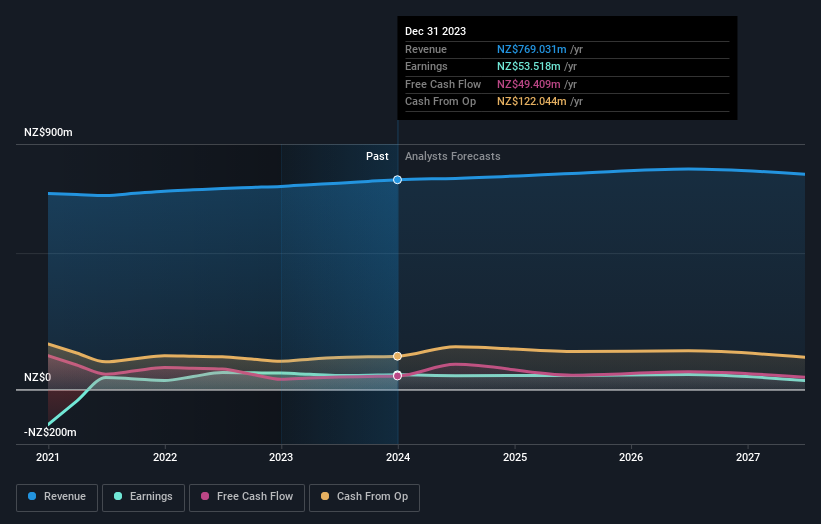- New Zealand
- /
- Media
- /
- NZSE:SKT
What Does SKY Network Television Limited's (NZSE:SKT) Share Price Indicate?
SKY Network Television Limited (NZSE:SKT), might not be a large cap stock, but it saw a decent share price growth of 10% on the NZSE over the last few months. While good news for shareholders, the company has traded much higher in the past year. With many analysts covering the stock, we may expect any price-sensitive announcements have already been factored into the stock’s share price. However, what if the stock is still a bargain? Let’s take a look at SKY Network Television’s outlook and value based on the most recent financial data to see if the opportunity still exists.
See our latest analysis for SKY Network Television
What's The Opportunity In SKY Network Television?
Good news, investors! SKY Network Television is still a bargain right now according to our price multiple model, which compares the company's price-to-earnings ratio to the industry average. In this instance, we’ve used the price-to-earnings (PE) ratio given that there is not enough information to reliably forecast the stock’s cash flows. we find that SKY Network Television’s ratio of 6.66x is below its peer average of 19.79x, which indicates the stock is trading at a lower price compared to the Media industry. What’s more interesting is that, SKY Network Television’s share price is quite stable, which could mean two things: firstly, it may take the share price a while to move closer to its industry peers, and secondly, there may be less chances to buy low in the future once it reaches that value. This is because the stock is less volatile than the wider market given its low beta.
What does the future of SKY Network Television look like?

Future outlook is an important aspect when you’re looking at buying a stock, especially if you are an investor looking for growth in your portfolio. Buying a great company with a robust outlook at a cheap price is always a good investment, so let’s also take a look at the company's future expectations. However, with a negative profit growth of -18% expected over the next couple of years, near-term growth certainly doesn’t appear to be a driver for a buy decision for SKY Network Television. This certainty tips the risk-return scale towards higher risk.
What This Means For You
Are you a shareholder? Although SKT is currently trading below the industry PE ratio, the negative profit outlook does bring on some uncertainty, which equates to higher risk. We recommend you think about whether you want to increase your portfolio exposure to SKT, or whether diversifying into another stock may be a better move for your total risk and return.
Are you a potential investor? If you’ve been keeping an eye on SKT for a while, but hesitant on making the leap, we recommend you research further into the stock. Given its current price multiple, now is a great time to make a decision. But keep in mind the risks that come with negative growth prospects in the future.
In light of this, if you'd like to do more analysis on the company, it's vital to be informed of the risks involved. For example, we've found that SKY Network Television has 2 warning signs (1 is a bit unpleasant!) that deserve your attention before going any further with your analysis.
If you are no longer interested in SKY Network Television, you can use our free platform to see our list of over 50 other stocks with a high growth potential.
New: Manage All Your Stock Portfolios in One Place
We've created the ultimate portfolio companion for stock investors, and it's free.
• Connect an unlimited number of Portfolios and see your total in one currency
• Be alerted to new Warning Signs or Risks via email or mobile
• Track the Fair Value of your stocks
Have feedback on this article? Concerned about the content? Get in touch with us directly. Alternatively, email editorial-team (at) simplywallst.com.
This article by Simply Wall St is general in nature. We provide commentary based on historical data and analyst forecasts only using an unbiased methodology and our articles are not intended to be financial advice. It does not constitute a recommendation to buy or sell any stock, and does not take account of your objectives, or your financial situation. We aim to bring you long-term focused analysis driven by fundamental data. Note that our analysis may not factor in the latest price-sensitive company announcements or qualitative material. Simply Wall St has no position in any stocks mentioned.
Have feedback on this article? Concerned about the content? Get in touch with us directly. Alternatively, email editorial-team@simplywallst.com
About NZSE:SKT
SKY Network Television
An entertainment company, provides sport and entertainment media services, and telecommunications services in New Zealand.
Excellent balance sheet second-rate dividend payer.
Similar Companies
Market Insights
Community Narratives



